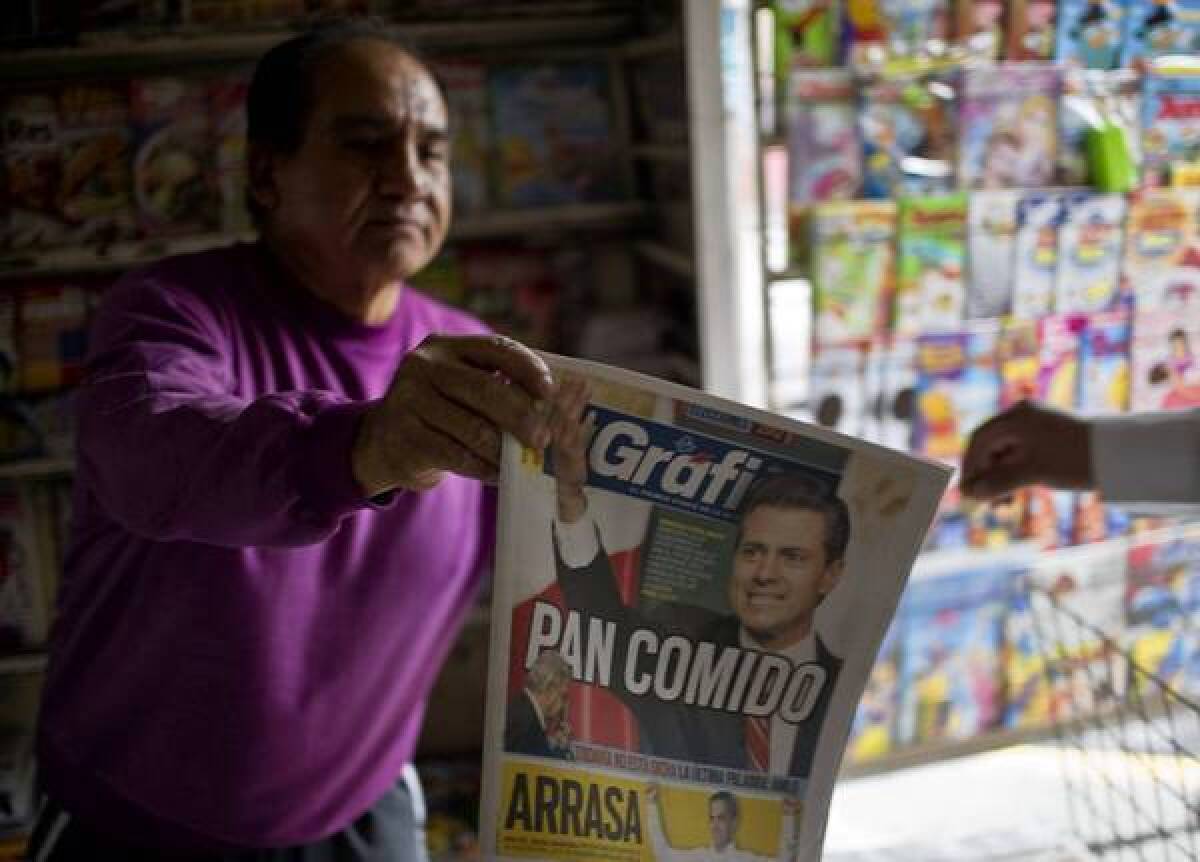In Mexico, the PAN’s election loss is wake-up call for party

- Share via
MEXICO CITY — On election night 12 years ago, the headquarters ofMexico’s main conservative party buzzed with the electric thrill of history as voters ousted the country’s longtime rulers.
This time, though, the cavernous hall echoed with defeat. On tables near the door, badges for guests sat in piles, unclaimed by no-shows.
The National Action Party, or PAN, woke up Monday wondering how to pick up the pieces from its worst drubbing in a generation.
The PAN, which made history by toppling the Institutional Revolutionary Party, or PRI, in 2000, finished a dismal third in Sunday’s presidential vote. Nearly complete results showed PAN candidate Josefina Vazquez Mota with about 25% of the ballots — well behind the presumptive victor, Enrique Peña Nieto of the PRI, and leftist candidate Andres Manuel Lopez Obrador.
The debacle extended almost across the board: The PAN lost a governorship in the western state of Jalisco that it had held since 1995 and fared so poorly in congressional races that it will probably drop to third place in terms of the number of seats. It even got booted from a pair of well-to-do boroughs in Mexico City that it had long governed.
Even as the votes were being counted, PAN loyalists groped for words to characterize the shellacking they were taking at the hands of the once left-for-dead PRI and Lopez Obrador’s fractious Democratic Revolution Party, or PRD.
“A disaster,” German Martinez, a former PAN president, declared Monday in a newspaper column. “An unmitigated wreck.”
The party’s current leader, Gustavo Madero, acknowledged that the results signified an “enormous defeat.”
The loss is likely to prompt finger-pointing among the party’s factions and may fuel calls for new leadership. Madero told a radio interviewer he would not quit at a time when soul-searching must begin.
“It’s more important, of greater responsibility and urgency for me, to remain to conduct this process and this reflection,” he said.
The defeat represented a sweeping rejection of the PAN’s reign under President Felipe Calderon, who oversaw a controversial war on drug cartels and whose administration failed to stoke enough job growth. Many voters blamed Calderon for the violence that has resulted in more than 50,000 deaths since he took office in 2006, and were unswayed by Vazquez Mota’s one-word slogan: “Different.”
Despite years of economic stability under their leadership, Calderon and his PAN predecessor, Vicente Fox, were seen as having failed to address the country’s staggering income disparities, its entrenched monopolies and its decrepit and graft-ridden school system.
Many Mexicans fed up with the PRI’s corruption and coercive ways when it ruled shook their heads in disappointment as similar practices flourished under its PAN successors.
At the same time, the PAN, with roots in the middle class and Roman Catholic belief, gave way to factionalism as it grew from a largely ignored fringe group into Mexico’s ruling party. Vazquez Mota represented a competing faction to Calderon’s, and she was not enthusiastically backed by Fox, who in the end angered PAN leaders by endorsing Peña Nieto.
“They used to be a politically coherent party with a right-of-center, social Christian orientation and highly respected leaders,” said George W. Grayson, a Mexico scholar at the College of William and Mary in Williamsburg, Va. “They’re no longer this group that exudes integrity and responsibility and civic maturity. They’re now afflicted by a number of wings.”
Grayson said the party could end up a fractious, third-party also-ran — much as the leftist PRD once was. At the moment, the PAN lacks an obvious healer to oversee the repair work ahead.
“There’s no one on the horizon who can be the doctor in chief,” Grayson said.
But some analysts see a potential road to recovery.
Although routed at the ballot box, the PAN may find itself playing a crucial power-broker role in Congress, where the PRI appears likely to need help passing planned reforms on energy, labor law and taxes.
That could give PAN lawmakers a reason to smooth over differences, or at least to ignore them for the sake of unity, and create a base from which to start fresh, said Carlos Ramirez, a Mexico analyst for the New York-based Eurasia Group. The PRI followed a similar course after a humiliating third-place finish in 2006.
“It is a disaster, but they have a good chance from that position to build and reconstruct the party,” Ramirez said of the PAN. “They have the glue of a need to come together.”
News assistant Cecilia Sánchez of The Times’ Mexico City bureau contributed to this report.
More to Read
Sign up for Essential California
The most important California stories and recommendations in your inbox every morning.
You may occasionally receive promotional content from the Los Angeles Times.










